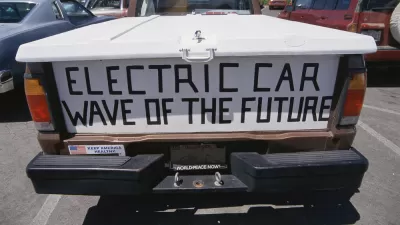A University of Minnesota study published in PNAS looks at alternatives including ethanol and electricity and determined that "it's hard to beat gasoline." Even electric vehicles can do better or worse depending on how utilities source electricity.
Seth Borenstein, science writer for The Associated Press, reports on a new study published Dec. 15 by the Proceedings of the National Academy of Sciences (PNAS) that evaluates the "life cycle air quality impacts of conventional and alternative light-duty transportation in the United States."
The authors published this amusing two-minute YouTube video that summarizes their findings as well if not better than the abstract on the PNAS.
The results might surprise true-believers in electric vehicles (EVs) and other alternatives to gasoline and diesel-burning internal combustion engine vehicles. However, it turns out this is our third report in as many years (see "Related" below) on this aspect of EVs, and each time, the results are the same.
Note the bar chart published in the Reason blog (copied from PNAS) showing mortality rates from air pollution associated with conventional and alternative powered vehicles.
"It's kind of hard to beat gasoline," said study co-author Julian Marshall, an engineering professor at the Center for Transportation Studies at the University of Minnesota, referring to both public health benefits and even global warming. "A lot of the technologies that we think of as being clean ... are not better than gasoline."
What's key is the power portfolio of the utility where the EV is charged, even the Department of Energy recognizes the importance of the utility power sources—you can determine the "Greenhouse Gas Emissions for Electric and Plug-In Hybrid Electric Vehicles" by inserting your zip code and type of EV.
States with high "Renewable and Alternative Energy Portfolio Standards" make EVs a good pick if you want to drive a green car. In fact, California goes even further by having a low carbon fuel standard where all fuels are evaluated in terms of greenhouse gas emissions.
As we noted last year, Washington and Vermont may be two of the two best states to own an EV—due to high percentages of hydro and nuclear power, respectively, in their energy portfolio. Not so in states with utilities dominated by coal power.
FULL STORY: Why Your All-Electric Car May Not Be So Green

Planetizen Federal Action Tracker
A weekly monitor of how Trump’s orders and actions are impacting planners and planning in America.

Chicago’s Ghost Rails
Just beneath the surface of the modern city lie the remnants of its expansive early 20th-century streetcar system.

San Antonio and Austin are Fusing Into one Massive Megaregion
The region spanning the two central Texas cities is growing fast, posing challenges for local infrastructure and water supplies.

Since Zion's Shuttles Went Electric “The Smog is Gone”
Visitors to Zion National Park can enjoy the canyon via the nation’s first fully electric park shuttle system.

Trump Distributing DOT Safety Funds at 1/10 Rate of Biden
Funds for Safe Streets and other transportation safety and equity programs are being held up by administrative reviews and conflicts with the Trump administration’s priorities.

German Cities Subsidize Taxis for Women Amid Wave of Violence
Free or low-cost taxi rides can help women navigate cities more safely, but critics say the programs don't address the root causes of violence against women.
Urban Design for Planners 1: Software Tools
This six-course series explores essential urban design concepts using open source software and equips planners with the tools they need to participate fully in the urban design process.
Planning for Universal Design
Learn the tools for implementing Universal Design in planning regulations.
planning NEXT
Appalachian Highlands Housing Partners
Mpact (founded as Rail~Volution)
City of Camden Redevelopment Agency
City of Astoria
City of Portland
City of Laramie





























